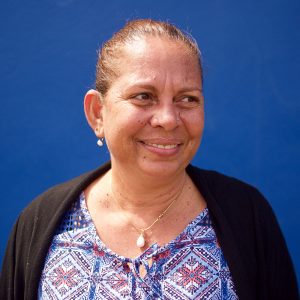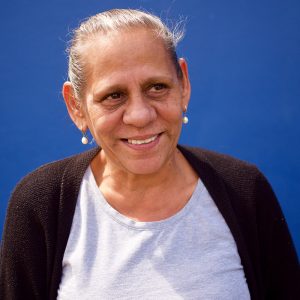 Every month in the lead up to our 2019 Graduation, ICAN will be featuring the students of its “Indigenous Financial Counselling Mentorship Program” here in the ICAN E-News.
Every month in the lead up to our 2019 Graduation, ICAN will be featuring the students of its “Indigenous Financial Counselling Mentorship Program” here in the ICAN E-News.
The Mentorship program provides nationally accredited and recognised training through the Diploma of Community Services (Financial Counselling), and offers personal and academic mentorship in a supported learning environment, connecting students through face-to-face classroom and weekly online training sessions. It reflects the growing number of Aboriginal and Torres Strait Islander peoples working in the financial counselling and capability sector, with nine financial capability workers, six financial counsellors and one financial literacy trainer currently participating in the 2017-2019 program.
This month, we meet Kelly Kitching of the Kimberly Money Management Services and Fran Clements from the Ngunga Women’s Resource Centre, both located in Derby, Western Australia.
Kelly Kitching has been working with the Kimberly Money Management Services in Derby, Western Australia as Program Manager for over a year.
What has been your experience so far through the Mentorship Program?
It’s good. A lot of information, it gives you knowledge of how and where to look for information toassist our clients with financial issues. I can take this back to my work place and to my colleagues and implement it in my community. It’s good, I like it.
I decided that I wanted to study the Diploma of Financial Counselling, because I am a Financial Capability Worker. I want to get the qualifications to help our people be financially educated and to ensure they are not on their own when financial burdens effect their lives. Back home, in the remote areas, I travel to Remote Communities and helping our people with money matters advising and assisting them in the right direction, they have very little support with literacy issues out there especially with no/limited access to phone and internet services.
The West Kimberly area is very remote and covers a vast area. there is a big need for financial counselling in Remote Regions. I see becoming a Financial Counsellor as the way to be able to help our people in Financial Hardship, So, that’s what my motivation has been. I wanted to take the next step, and study the Diploma.
How has the Mentorship Program assisted you in your own work?
The Mentorship Program gives us a lot of practical knowledge about financial counselling, working with people and clients and a lot of discussion about the kinds of situations we might be working in with clients. In these discussions, we find that there are some similarities of client situations in other areas, where the other students come from and are working in.
There are a few of us in the class that all work very remotely, so we have that connection.
What kind of personal and/or professional benefits has the Mentorship Program provided you with?
The program helps us at many different levels. From a personal perspective, we do this kind of work every day with our families. The Program helps me to be more informed of practice, to understand the changes that are happening around us local state and federal, everything that we learn then helps me to work with our families and our communities on the ground.
The sponsorship for the program was a great incentive and I am very grateful to be accepted to ICAN for the training to assist and support me to gain a qualification in Diploma of Financial Counselling. The staff there are so supportive, also for my employer Winun Ngari Aboriginal Corporation for approving and accepting my study leave in work and block releases to attend and support me on this journey.
What has been your experience in doing the course with other Indigenous students?
I always really enjoy coming to these kinds of programs because you get good ideas from each other. When I’m back home working and feel stuck on something when working with a client, I can ring the other students for guidance. They can really help you out, so you don’t feel that you’re on your own. It’s been really good because we meet face to face in Cairns, and even though we’re in different States, we can all connect with each other by phone or online, and we can all have that input. We learn and get help from each other, and it doesn’t matter where we’re located – we support each other.
 Fran Clements is a Financial Counselling Coordinator and has been working with the Ngunga Women’s Resource Centre in Derby since 2013.
Fran Clements is a Financial Counselling Coordinator and has been working with the Ngunga Women’s Resource Centre in Derby since 2013.
What has been your experience so far through the Mentorship Program?
I actually started studying the Diploma of Financial Counselling in 2014. There were a lot of challenges in trying to do the Diploma in an online-only environment, and there wasn’t a lot of support offered to students at that time. I joined the Mentorship Program in 2017 as a way to complete my Diploma and be able to give back to my people. It’s been a great experience being able to do the course in a face-to-face environment. I enjoy the classroom setting and it’s been a good way of learning in this course. When we come to each block training, we get that support. The Trainer and the support from Majella [Training Coordinator] have been great. We also have a good student support network which I didn’t have before. We get on the phone and also email each other, we also have a site where we can ask each other questions and support each other that way too.
How has the Mentorship Program assisted you in your own work?
The Program has assisted me to build more confidence in being able to advocate for the need for financial counselling for our organisation and community. It has also helped me in learning the financial counselling process, especially in areas that are new, like negotiating on behalf of clients and writing to creditors.
What kind of personal and/or professional benefits has the Mentorship Program provided you with?
Personally, the benefits will be that when I’ve completed the course, I’ll have my Diploma! I’ll be the first in my family and in the area of financial counselling, it’s big because I have four children, ten grandchildren and two great-grandchildren and being able to teach them also, about the financial side of things, so that they don’t struggle like we struggled. So it’s a personal motivation and an achievement to get my piece of paper!
For me, the knowledge learned in this course is so important, because money and dealing with money is something that starts from home, teaching the kids the basics about finance – that it’s something we can learn about, not just when it gets to a crisis moment. With assistance from a Financial Counsellor, those little steps can start now.
There are also benefits in being part of a big network. The course also helps us to learn how to better carry out our roles, to be able to help our clients better, because that’s what it’s all about, the clients.
What has been your experience in doing the course with other Indigenous students?
It’s been great, because having that support and being away from home and away from interruptions in order to be able to focus on the course and our assessments is really good. As a group, we can all discuss issues, share the way we do things and provide feedback to each other as well. Coming here to Cairns for each week of training has been really good.
****
The third national Mentorship program commenced in October 2017, bringing together Aboriginal and Torres Strait Islander students from Queensland, New South Wales, Victoria, South Australia and Western Australia. The program is delivered in partnership with the Commonwealth Bank of Australia, who sponsors scholarships for Aboriginal and Torres Strait Islander student participants to successfully undertake their Diploma of Financial Counselling. The Commonwealth Bank Mentorship Program Scholarships cover the full course fees for the Diploma.
Student participants of the Mentorship Program met in Cairns last week for the counselling and mental health components of the program, and are expected to graduate in mid-2019.